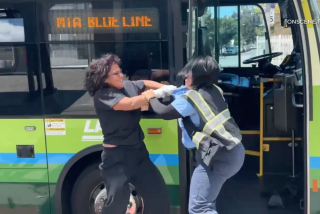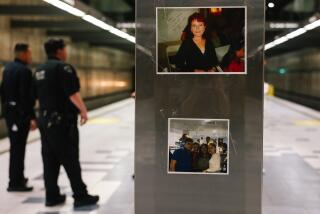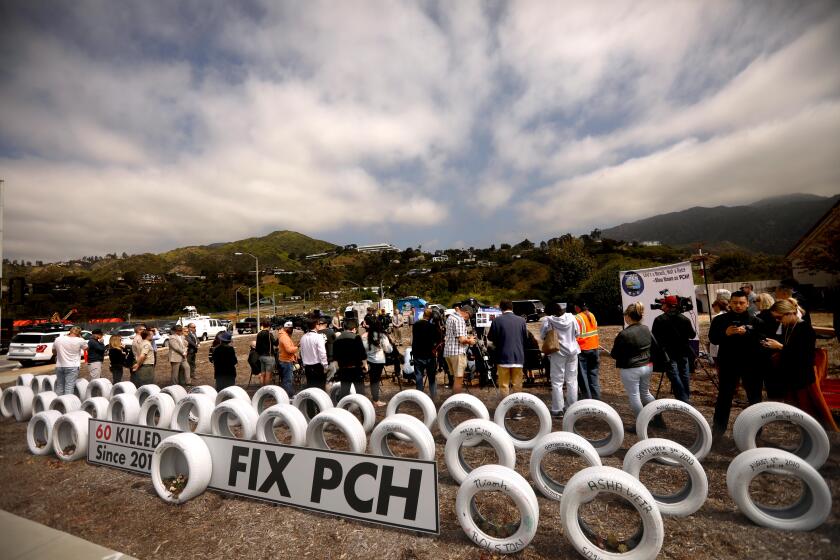Stranded Bus Riders Forced to Improvise : Transit: Good Samaritans help some. Others hoof it.
If he had wanted to capitalize on a bad situation, Carlos Lucero could have employed his red pickup truck as a bandit cab, turning a quick dollar by catering to the anxious hordes of bus riders stranded on Sunset Boulevard.
Instead, the 57-year-old security guard spent Monday morning dispensing random acts of kindness along the famed thoroughfare, giving free rides to a Hollywood hair stylist, a movie usher at the Beverly Connection, a cook at an Italian restaurant, and an Echo Park woman on her way to a parenting class.
“I’ve always thought that if you did a favor, God would pay you back--many times over,” said Lucero, a Guatemala native, who cruised the boulevard while a tape of Spanish-language Christian music thumped inside his truck.
The commuters who piled into Lucero’s truck were among the thousands of car-less Angelenos forced to improvise their way along Sunset--one of the city’s most culturally diverse arteries, a route where the much-maligned mass transit system serves as a vital link in daily life.
Many of those stuck were immigrants, the foot soldiers in Los Angeles’ low-income work force, for whom the lumbering, graffiti-scarred buses are the only way to a housecleaning job in Pacific Palisades or a construction site Downtown. In a city whose history, image and fate have long been tied to the automobile, they saw Monday’s strike as just another indignity for an already beleaguered commuting public.
“They’re telling us we’re worse than garbage,” said Leyla Amin, a 24-year-old native of Costa Rica, who waited vainly at a Hollywood corner for a ride to her Westside secretarial job. “They wouldn’t leave the garbage out without picking it up, would they?”
Well, yes, they have been known to do that, but it came as little comfort to Amin. Two hours after leaving her Glendale home, she finally gave up and called a cab.
Some commuters, surprised by the mechanics’ strike that crippled the Metropolitan Transportation Authority’s bus system, telephoned friends or co-workers. Hospital manager Sandy Carter, stranded at a bus stop near Sunset and La Brea Avenue, was told that a Cedars-Sinai Medical Center van would pick her up. She didn’t even want to think about her trip home, destined to be a hellish journey back to Pasadena.
Limited bus service left many stuck at the same corner, including Daniela Adamcova, a 31-year-old Czechoslovakian immigrant, who was late for her job as a salesclerk Downtown. Agustin Carrillo, a 24-year-old house painter from Hawthorne, had been waiting for two hours. Idalia Garcia, three hours after leaving South-Central Los Angeles, was resigned to losing the $45 that she expected to earn cleaning a Beverly Hills home.
“This is not fair to us,” said Garcia shortly before she boarded a yellow school bus put into emergency service by the MTA that took her down La Brea, back to South-Central. “Not everyone can afford a car.”
Others simply decided to hoof it, trekking along Sunset in the searing midday sun. Needing to get to Hollywood, 43-year-old Shirley McKenzie had ridden on a Culver City bus from her home in Marina del Rey to Westwood, only to learn that the MTA bus she was counting on wouldn’t be along.
“It’s frustrating, but what are you going to do?” she said, as she rounded a noisy, dangerous stretch of the boulevard with no sidewalks at the western edge of Beverly Hills. No sooner had she spoken than an MTA bus approached from behind, slowing briefly and then barreling forward, leaving her in a swirl of smoke.
The sign on top said, “Not In Service.”
Closer to the ocean, bus stops usually crammed with nannies and housekeepers coming and going from pricey homes were largely deserted. Miriam Hernandez, 23, a live-in maid from North Hollywood, had a friend drop her off at the main commercial strip in Pacific Palisades, then walked the remaining mile to her job.
“I don’t go home until Saturday,” she said. “I’ll be OK as long as they settle it by then.”
Nothing could take the bounce out of DJ Slice’s stride, even though the first bus strike in more than a decade had coincided with his first day as a bus rider.
As he strolled east on Sunset, from Vermont Avenue toward Downtown, the 21-year-old music producer said he had grown weary of the long drive from his home in Pomona to the Motown studios in Hollywood.
“If you drive every single day, all day every day, like me, it’ll kill you,” said Slice, breezing through Silver Lake, then Echo Park, on stylish leather sandals. “I figured that on the bus at least I could sleep and relax.”
He said he decided to switch to mass transit at the urging of his father, a veteran Los Angeles County safety officer and devoted bus commuter. Monday was the first day of the experiment. Slice had spent the weekend at his girlfriend’s house in Hollywood and was planning to take the bus Downtown to visit his father, who had gone to work in Slice’s ’84 Ford pickup.
“That’s why I loaned my dad the truck--to start getting used to this,” said Slice, who eventually picked up his car keys at the county Department of Public Social Services on East 4th Street, where his father works as a guard. “Today may be screwed up. But I’m getting on that bus.”
Carlos Lucero had not planned to spend his morning bailing out the stranded. He had taken his mother-in-law to County-USC Medical Center, where she was scheduled to have a cast removed from her arm.
On the way back, however, Lucero saw the crowd gathered at Sunset and Echo Park Avenue, where more than a dozen people were milling anxiously, craning their necks in search of a bus that would never come. Figuring he would offer a quick ride, maybe as far as Vermont, Lucero pulled to the curb.
“It makes me nervous to see people with problems,” Lucero said later. “If I can help, I give a hand.”
Yolanda Chavez, trying to make it to a parenting class in the Mid-Wilshire area before 10 a.m., hopped in the front of his Mitsubishi pickup, right next to the “Jesus Te Ama” sticker on the dashboard. Roberto Ramirez, 25, who works for a Hollywood paralegal, piled into the camper shell, alongside Reyna Castillo, a 31-year-old cook anxious to make it to her Italian restaurant to prepare for the lunch shift.
“Maybe I’ll buy a car one of these days,” Castillo said. “When I hit the lottery.”
For the next hour and a half, Lucero carted them through Hollywood, along the way picking up Susana Alcazar, 34, a stylist at Irma’s Beauty Salon, and Mordechai Raphael, 27, an usher at the Beverly Connection, who was wearing a red vest with a button advertising “It Could Happen to You,” a new movie about a winning lottery ticket.
“This is sort of like a lifeboat situation,” said Raphael, as he crouched in the back of the truck on a soiled piece of green carpet, next to a gallon jug of antifreeze. When he hopped out, he handed Lucero a dollar for his trouble.
Times staff writer Ron Russell contributed to this story.
More to Read
Start your day right
Sign up for Essential California for news, features and recommendations from the L.A. Times and beyond in your inbox six days a week.
You may occasionally receive promotional content from the Los Angeles Times.





